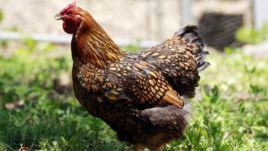VOA慢速英语: 微不足道的钱
- 参考译文
- 听力原文
Hey, I'm Workin' for Chickenfeed Here!
我挣的钱微不足道!
I'm Susan Clark with WORDS AND THEIR STORIES, a program in Special English on the Voice of America.
我是苏珊·克拉克,这里是美国之音慢速英语词汇掌故。
Almost every language in the world has a saying that a person can never be too rich.
世界上几乎每一种语言都有个说法:一个人不可能永远富有。
Americans, like people in other countries, always want more money. One way they express this is by protesting that their jobs do not pay enough. A common expression is, "I am working for chickenfeed." It means working for very little money. The expression probably began because seeds fed to chickens made people think of small change. Small change means metal coins of not much value, like nickels which are worth five cents.
跟世界上其它国家的人一样,美国人也想要更多的钱。其中一种表现就是抗议他们工作挣的太少。一个常见的说法是:“我为了鸡食工作。”意思是我挣的钱太少。这个表达开始使用时因为喂鸡时让人想到小零钱。小零钱就是面值不大的金属硬币,镍只是五分镍币。
An early use of the word chickenfeed appeared in an American publication in nineteen thirty. It told about a rich man and his son. Word expert Mitford Mathews says it read, "I'll bet neither the kid nor his father ever saw a nickel or a dime. They would not have been interested in such chickenfeed."
这个单词chickenfeed最早出现在公众视野里是在19世纪。讲的是一个富商和他的儿子。词汇专家米特福德•马修斯说,上面写着:“我敢打赌这个孩子或者他爸爸一定从没有见过五分镍币或者一角硬币。他们不会对这样微不足道的小钱感兴趣的。”
Chickenfeed also has another interesting meaning known to history experts and World War Two spies and soldiers.
对历史学家以及第二次世界大战的间谍和士兵来说,Chickenfeed还有另一个有趣的意思。
Spy expert Henry S. A. Becket writes that some German spies working in London during the war also worked for the British. The British government had to make the Germans believe their spies were working. So, British officials gave them mostly false information. It was called chickenfeed.
间谍专家亨利·贝克特写到战争期间在英国工作的德国间谍同样为英国政府工作。英国政府需要让德国人相信他们的间谍仍然在运作中,所以,英国官员给他们的信息大部分都是假的,这就叫“情报喂养(chickenfeed)”。
The same person who protests that he is working for chickenfeed may also say, "I am working for peanuts." She means she is working for a small amount of money.
抗议工资挣的少的人也可以说:“我为了坚果工作”。她的意思是只能挣少量的钱。
It is a very different meaning from the main one in the dictionary. That meaning is small nuts that grow on a plant.
这个词义与字典上主要的意思不同。字典上的意思是生长在一株植物上得小坚果。
No one knows for sure how a word for something to eat also came to mean something very small. But, a peanut is a very small food.
没有人知道一种人们吃的东西怎么开始有小东西的意思了。但是,坚果确实是一种小的食物。
The expression is an old one. Word expert Mitford Mathews says that as early as eighteen fifty-four, an American publication used the words peanut agitators. That meant political troublemakers who did not have a lot of support.
这种表达是一种老的说法。词汇专家米特福德•马修斯说早在1854年,一份美国出版刊物使用坚果来形容煽动讲话的人,意思是制造麻烦的政客没有很多支持。
Another reason for the saying about working for peanuts may be linked to elephants. Think of how elephants are paid for their work in the circus. They receive food, not money. One of the foods they like best is peanuts.
另一个原因说“为坚果而工作”也许是跟大象有关系。想一下大象在马戏团里工作才能得到多少犒赏。它们得到的是食物,而不是钱。它们最喜欢的一种食物就是坚果。
When you add the word gallery to the word peanut you have the name of an area in an American theater. A gallery is a high seating area or balcony above the main floor.
当你把画廊跟坚果结合在一起的时候,就会得到一个美国剧院里一个地方的名字:顶层楼座
The peanut gallery got its name because it is the part of the theater most distant from where the show takes place. So, peanut gallery tickets usually cost less than other tickets. People pay a small amount of money for them.
剧场顶层楼座这个名字的由来是因为这一部分是距离演出最远的地方。因此这类的门票通常比其他门票便宜。人们只需要付一少部分钱就可以。
(MUSIC)
This Special English program, WORDS AND THEIR STORIES, was written by Jeri Watson. This is Susan Clark.
这是慢速英语词汇掌故。杰瑞·瓦特森撰写。我是苏珊·克拉克。
Hey, I'm Workin' for Chickenfeed Here!
I'm Susan Clark with WORDS AND THEIR STORIES, a program in Special English on the Voice of America.
Almost every language in the world has a saying that a person can never be too rich.
Americans, like people in other countries, always want more money. One way they express this is by protesting that their jobs do not pay enough. A common expression is, "I am working for chickenfeed." It means working for very little money. The expression probably began because seeds fed to chickens made people think of small change. Small change means metal coins of not much value, like nickels which are worth five cents.
An early use of the word chickenfeed appeared in an American publication in nineteen thirty. It told about a rich man and his son. Word expert Mitford Mathews says it read, "I'll bet neither the kid nor his father ever saw a nickel or a dime. They would not have been interested in such chickenfeed."
Chickenfeed also has another interesting meaning known to history experts and World War Two spies and soldiers.
Spy expert Henry S. A. Becket writes that some German spies working in London during the war also worked for the British. The British government had to make the Germans believe their spies were working. So, British officials gave them mostly false information. It was called chickenfeed.
The same person who protests that he is working for chickenfeed may also say, "I am working for peanuts." She means she is working for a small amount of money.
It is a very different meaning from the main one in the dictionary. That meaning is small nuts that grow on a plant.
 |
No one knows for sure how a word for something to eat also came to mean something very small. But, a peanut is a very small food.
The expression is an old one. Word expert Mitford Mathews says that as early as eighteen fifty-four, an American publication used the words peanut agitators. That meant political troublemakers who did not have a lot of support.
Another reason for the saying about working for peanuts may be linked to elephants. Think of how elephants are paid for their work in the circus. They receive food, not money. One of the foods they like best is peanuts.
When you add the word gallery to the word peanut you have the name of an area in an American theater. A gallery is a high seating area or balcony above the main floor.
The peanut gallery got its name because it is the part of the theater most distant from where the show takes place. So, peanut gallery tickets usually cost less than other tickets. People pay a small amount of money for them.
(MUSIC)
This Special English program, WORDS AND THEIR STORIES, was written by Jeri Watson. This is Susan Clark.
- 频道推荐
- |
- 全站推荐
- 推荐下载
- 网站推荐




















